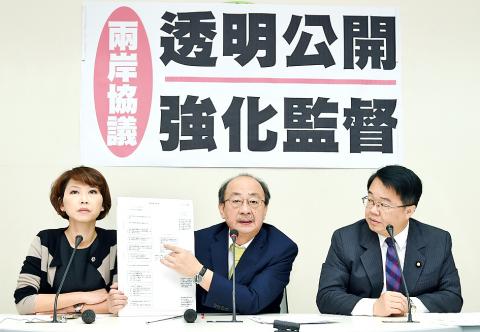The Democratic Progressive Party (DPP) caucus yesterday released a draft bill on monitoring cross-strait negotiations and agreements — without a clause that would let an agreement come into effect automatically if the review process stalls.
After meeting for more than two hours, DPP caucus members decided on a proposal for a bill to monitor cross-strait exchanges that would allow the legislature to intervene before, during and after a cross-strait negotiation and the signing of a cross-strait deal.
“After thorough discussions at the caucus meeting, [caucus members] have reached an agreement on a version [of the bill to monitor cross-strait talks and agreements] that would give the legislature the authority to intervene before, during and after negotiations,” DPP caucus whip Ker Chien-ming (柯建銘) told a news conference in Taipei following the meeting. “This is a mechanism that we have never had in the past.”

Photo: Liao Chen-huei, Taipei Times
Ker said that according to the proposal, the executive branch must report to the legislature prior to any negotiations with a detailed negotiation plan, including national security checks and the effect negotiations could have.
During talks, the proposal would require the government to report to the legislature when the two sides reach an initial consensus or would like to implement major changes to a proposal, with the talks only being able to resume with the legislature’s consent, Ker said.
“The most important part of the proposal is that a draft agreement must undergo a clause-by-clause review by the legislature,” he said.
Following talks, the government should report the outcome to the legislature and the negotiations can be stopped if there are any problems, he added. “In other words, the executive branch must have the authorization of the legislature for any phase of negotiations and before signing an agreement.”
A clause saying the legislature would have up to 90 days to review a draft agreement and 30 days for a signed agreement, with a possible extension of 10 days — but if the legislature fails to approve the deal by the deadline the agreement would automatically take effect — did not appear in the final draft.
The clause was dubbed the “Chang Ching-chung clause,” because former Chinese Nationalist Party (KMT) legislator Chang Ching-chung (張慶忠) had insisted that the cross-strait service trade agreement should automatically take effect according to the Act Governing the Exercise of Legislative Power (立法院職權行使法) after it sat idle at the legislature for three months.
The DPP boycotted a review of the agreement in 2014.
When asked about the clause, DPP caucus secretary-general Chen Ting-fei (陳亭妃) denied it had been “removed,” because “there was never a Chang Ching-chung clause.”
Caucus members “made different proposals and some of those never made it to the final phase, why would there be any controversy?” Chen said.

Right-wing political scientist Laura Fernandez on Sunday won Costa Rica’s presidential election by a landslide, after promising to crack down on rising violence linked to the cocaine trade. Fernandez’s nearest rival, economist Alvaro Ramos, conceded defeat as results showed the ruling party far exceeding the threshold of 40 percent needed to avoid a runoff. With 94 percent of polling stations counted, the political heir of outgoing Costa Rican President Rodrigo Chaves had captured 48.3 percent of the vote compared with Ramos’ 33.4 percent, the Supreme Electoral Tribunal said. As soon as the first results were announced, members of Fernandez’s Sovereign People’s Party

EMERGING FIELDS: The Chinese president said that the two countries would explore cooperation in green technology, the digital economy and artificial intelligence Chinese President Xi Jinping (習近平) yesterday called for an “equal and orderly multipolar world” in the face of “unilateral bullying,” in an apparent jab at the US. Xi was speaking during talks in Beijing with Uruguayan President Yamandu Orsi, the first South American leader to visit China since US special forces captured then-Venezuelan president Nicolas Maduro last month — an operation that Beijing condemned as a violation of sovereignty. Orsi follows a slew of leaders to have visited China seeking to boost ties with the world’s second-largest economy to hedge against US President Donald Trump’s increasingly unpredictable administration. “The international situation is fraught

MORE RESPONSIBILITY: Draftees would be expected to fight alongside professional soldiers, likely requiring the transformation of some training brigades into combat units The armed forces are to start incorporating new conscripts into combined arms brigades this year to enhance combat readiness, the Executive Yuan’s latest policy report said. The new policy would affect Taiwanese men entering the military for their compulsory service, which was extended to one year under reforms by then-president Tsai Ing-wen (蔡英文) in 2022. The conscripts would be trained to operate machine guns, uncrewed aerial vehicles, anti-tank guided missile launchers and Stinger air defense systems, the report said, adding that the basic training would be lengthened to eight weeks. After basic training, conscripts would be sorted into infantry battalions that would take

GROWING AMBITIONS: The scale and tempo of the operations show that the Strait has become the core theater for China to expand its security interests, the report said Chinese military aircraft incursions around Taiwan have surged nearly 15-fold over the past five years, according to a report released yesterday by the Democratic Progressive Party’s (DPP) Department of China Affairs. Sorties in the Taiwan Strait were previously irregular, totaling 380 in 2020, but have since evolved into routine operations, the report showed. “This demonstrates that the Taiwan Strait has become both the starting point and testing ground for Beijing’s expansionist ambitions,” it said. Driven by military expansionism, China is systematically pursuing actions aimed at altering the regional “status quo,” the department said, adding that Taiwan represents the most critical link in China’s